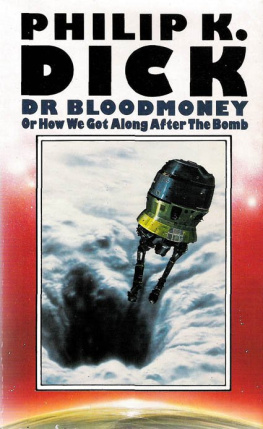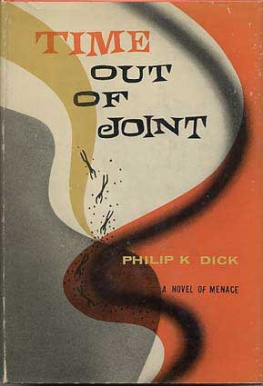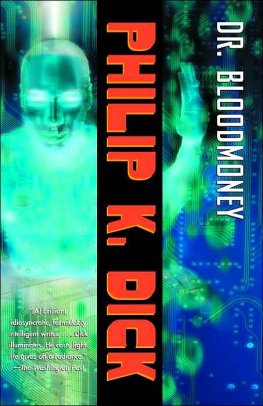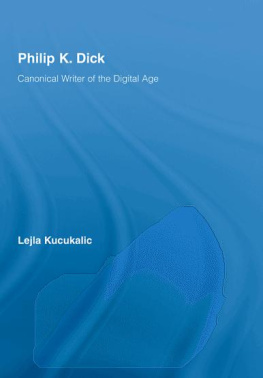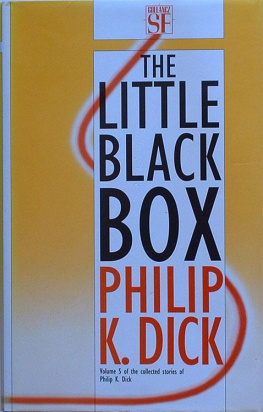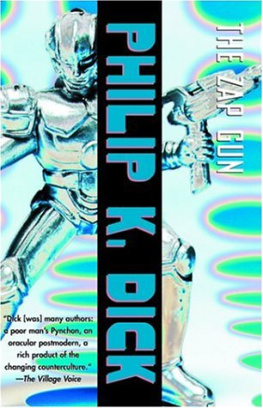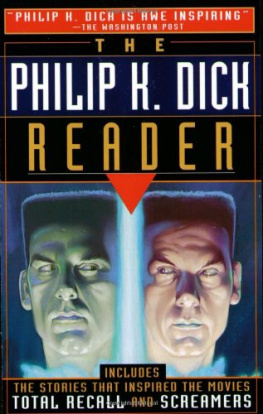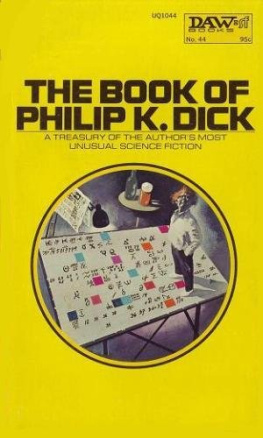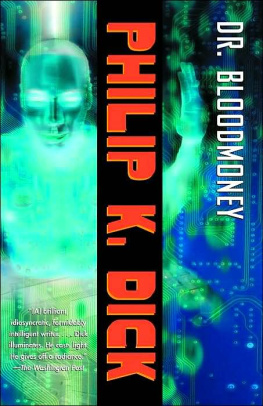Dr. Bloodmoney
or How We Got Along After the Bomb
by
Philip Kindred Dick
1965

All Your Books Are Belong To Us !
http://c3jemx2ube5v5zpg.onion
Dr. Bloodmoney
or How We Got Along After the Bomb
Copyright 1965 Philip Kindred Dick
Dick wrote the novel in 1963 with working titles In Earth's Diurnal Course and A Terran Odyssey. Ace editor Donald Wollheim however suggested the final title which references Stanley Kubrick's film Dr. Strangelove or: How I Learned to Stop Worrying and Love the Bomb (1964).
Dr. Bloodmoney is set in a post-apocalyptic future. In 1974, before the start of the narrative, Dr. Bruno Bluthgeld (German for "Blood-Money") had led a project testing nuclear weapons as a protectionary measure against Communist China and the Soviet Union. However, a miscalculation caused an atmospheric nuclear accident leading to widespread fallout and mutations. More recently the United States has been involved in a prolonged period of hostilities with China and the Soviet Union erupting in a war in Cuba.
Contents
I
Early in the bright sun-yellowed morning, Stuart McConchie swept the sidewalk before Modern TV Sales & Service, hearing the cars along Shattuck Avenue and the secretaries hurrying on high heels to their offices, all the stirrings and fine smells of a new week, a new time in which a good salesman could accomplish things. He thought about a hot roll and coffee for his second breakfast, along about ten. He thought of customers whom he had talked to returning to buy, all of them perhaps today, his book of sales running over, like that cup in the Bible. As he swept he sang a song from a new Buddy Greco album and he thought too how it might feel to be famous, a world-famous great singer that everyone paid to see at such places as Harrah's in Reno or the fancy expensive clubs in Las Vegas which he had never seen but heard so much about.
He was twenty-six years old and he had driven, late on certain Friday nights, from Berkeley along the great ten lane highway to Sacramento and across the Sierras to Reno, where one could gamble and find girls; he worked for Jim Fergesson, the owner of Modern TV, on a salary and commission basis, and being a good salesman he made plenty. And anyhow this was 1981 and business was not bad. Another good year, booming from the start, where America got bigger and stronger and everybody took more home.
Morning, Stuart. Nodding, the middle-aged jeweler from across Shattuck Avenue passed by Mr. Crody, on his way to his own little store.
All the stores, the offices, opening, now; it was after nine and even Doctor Stockstill, the psychiatrist and specialist in psychosomatic disorders, appeared, key in hand, to start up his high-paying enterprise in the glass-sided office building which the insurance company had built with a bit of its surplus money. Doctor Stockstill had parked his foreign car in the lot; he could afford to pay five dollars a day. And now came the tall, long-legged pretty secretary of Doctor Stockstill's, a head taller than he. And, sure enough as Stuart watched, leaning on his broom, the furtive first nut of the day sidled guiltily toward the psychiatrist's office.
It's a world of nuts, Stuart thought, watching. Psychiatrists make a lot. If I had to go to a psychiatrist I'd come and go by the back door. Nobody'd see me and jeer. He thought, Maybe some of them do; maybe Stockstill has a back door. For the sicker ones, or rather (he corrected his thought) the ones who don't want to make a spectacle out of themselves; I mean the ones who simply have a problem, for instance worry about the Police Action in Cuba, and who aren't nuts at all, just-concerned.
And he was concerned, because there was still a good chance that he might be called up for the Cuban War, which had now become bogged down in the mountains once more, despite the new little anti-personnel bombs that picked out the greasy gooks no matter how well dug in. He himself did not blame the president it wasn't the president's fault that the Chinese had decided to honor their pact. It was just that hardly anyone came home from fighting the greasy gooks free of virus bone infections. A thirty-year-old combat veteran returned looking like some dried mummy left out of doors to hang for a century... and it was hard for Stuart McConchie to imagine himself picking up once more after that, selling stereo TV again, resuming his career in retail selling.
Morning, Stu, a girl's voice came, startling him. The small, dark-eyed waitress from Edy's candy store. Day dreaming so early? She smiled as she passed on by along the sidewalk.
Heck no, he said, again sweeping vigorously.
Across the street the furtive patient of Doctor Stockstill's, a man black in color, black hair and eyes, light skin, wrapped tightly in a big overcoat itself the color of deep night, paused to light a cigarette and glance about. Stuart saw the man's hollow face, the staring eyes and the mouth, especially the mouth. It was drawn tight and yet the flesh hung slack, as if the pressure, the tension there, had long ago ground the teeth and the jaw away; the tension remained there in that unhappy face, and Stuart looked away.
Is that how it is? he wondered. To be crazy? Corroded away like that, as if devoured by... he did not know what by. Time or perhaps water; something slow but which never stopped. He had seen such deterioration before, in watching the psychiatrist's patients come and go, but never this bad, never this complete.
The phone rang from inside Modern TV, and Stuart turned to hurry toward it. When next he looked out onto the street the black-wrapped man had gone, and once more the day was regaining its brightness, its promise and smell of beauty. Stuart' shivered, picked up his broom.
I know that man, he said to himself. I've see his picture or he's come into the store. He's either a customer an old one, maybe even a friend of Fergesson's or he's an important celebrity.
Thoughtfully, he swept on.
To his new patient, Doctor Stockstill said, Cup of coffee? Or tea or Coke? He read the little card which Miss Purcell had placed on his desk. Mr. Tree, he said aloud. Any relation to the famous English literary family? Iris Tree, Max Beerbohm...
In a heavily-accented voice Mr. Tree said, That is not actually my name, you know. He sounded irritable and impatient. It occurred to me as I talked to your girl.
Doctor Stockstill glanced questioningly at his patient.
I am world-famous, Mr. Tree said. I'm surprised you don't recognize me; you must be a recluse or worse. He ran a hand shakily through his long black hair. There are thousands, even millions of people in the world, who hate me and would like to destroy me. So naturally I have to take steps; I have to give you a made-up name. He cleared his throat and smoked rapidly at his cigarette; he held the cigarette European style, the burning end within, almost touching his palm.
Oh my god, Doctor Stockstill thought. This man, I do recognize him. This is Pruno Bluthgeld, the physicist. And he is right; a lot of people both here and in the East would like to get their hands on him because of his miscalculation back in 1972. Because of the terrible fall-out from the high-altitude blast which wasn't supposed to hurt anyone; Bluthgeld's figures proved it in advance.
Do you want me to know who you are? Doctor Stockstill asked. Or shall we accept you simply as 'Mr. Tree'? It's up to you; either way is satisfactory to me.
Let's simply get on, Mr. Tree grated.
All right. Doctor Stockstill made himself comfortable, scratched with his pen against the paper on his clipboard. Go ahead.


